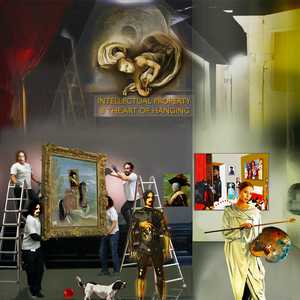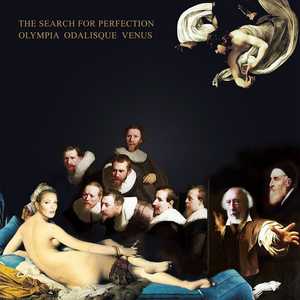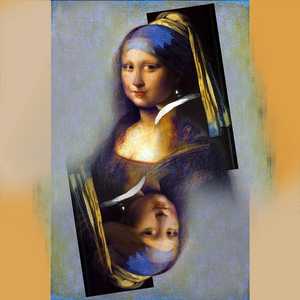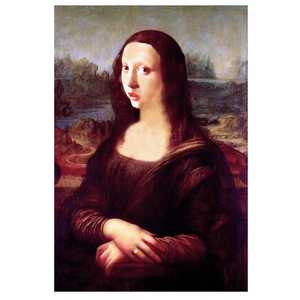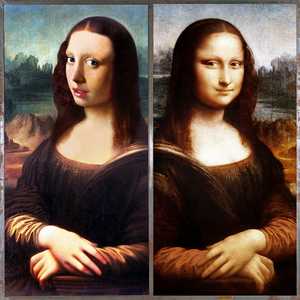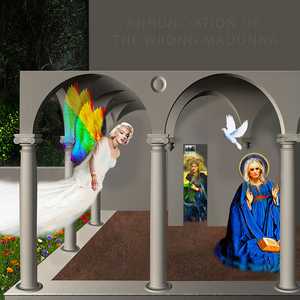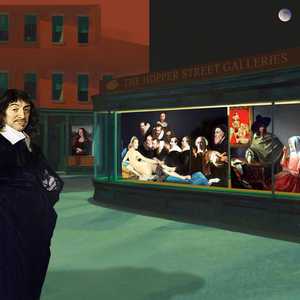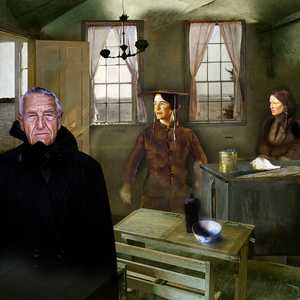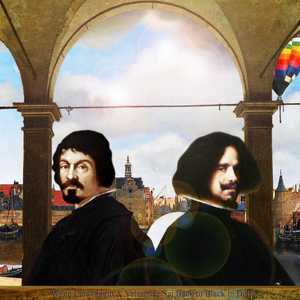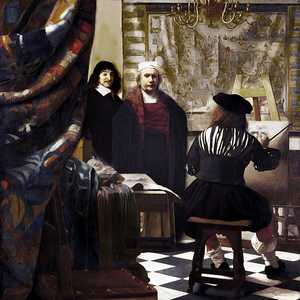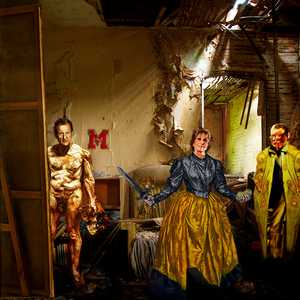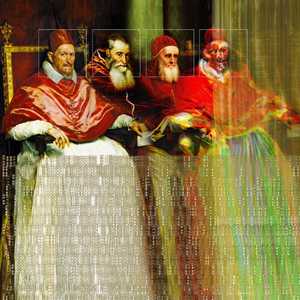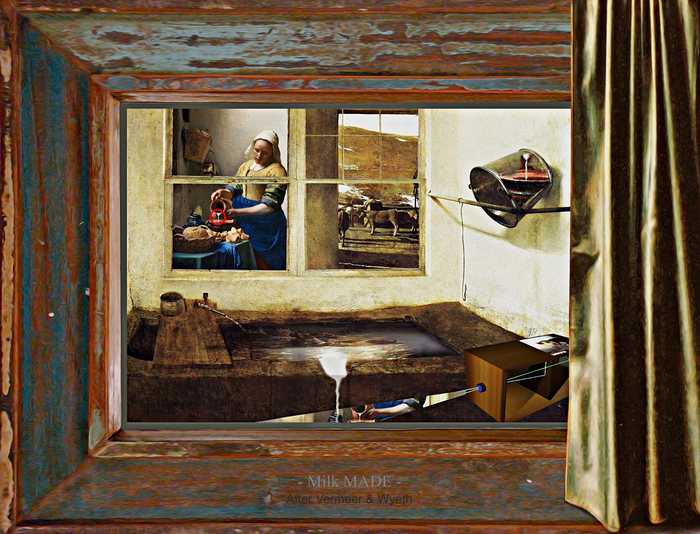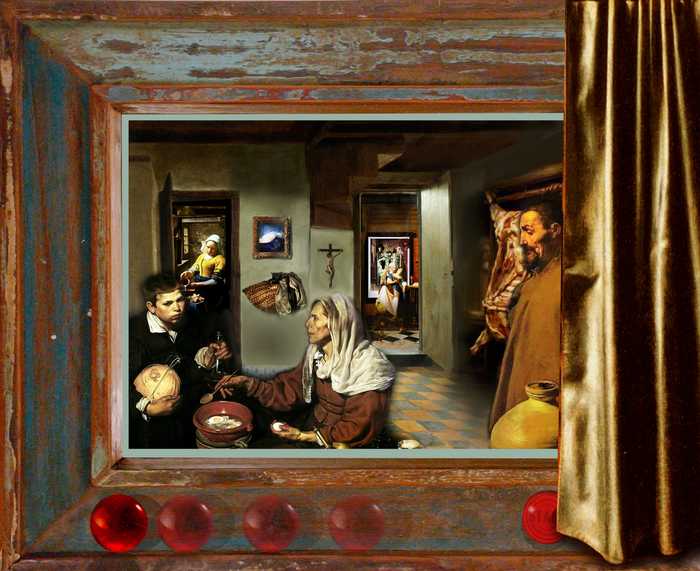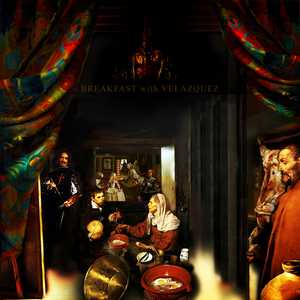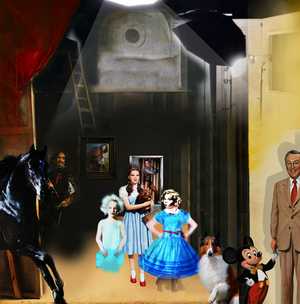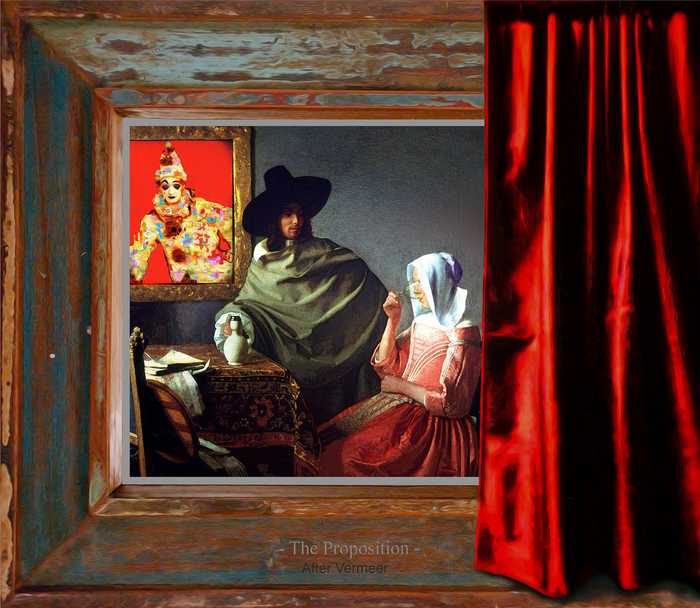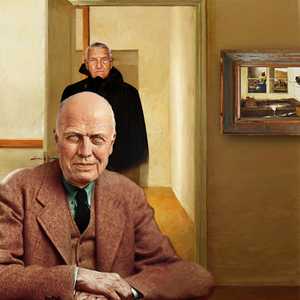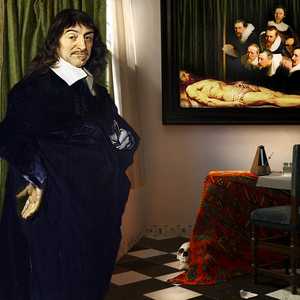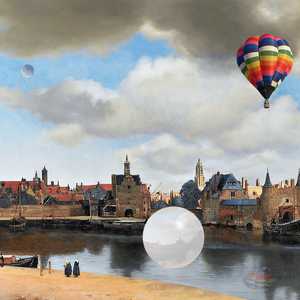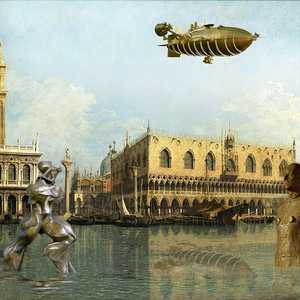Art About Art
Click on an image to see an enlargement - you can then use the 'backward/forward' arrows under the bottom right-hand corner of enlargement to see all artworks in this collection. You can also use the backward/forward arrows on your keyboard to do the same.
Intellectual Property & The Art of Hanging
The Search for Perfection
2 in 1 Icon
A double portrait that combines, merged and reworked images of Leonardo Da Vinci's 'Mona Lisa' and Johannes Vermeer's 'Girl with a Pearl Earring' - creating a composition that is reminiscent of a picture playing-card.
It has become a fresh artwork that is concerned with making the viewer think about 'what makes a painting so famous, so iconic' ...which portrait they prefer and why ...how the portraits are similar and yet differ from each other... what is 'Beauty'... and how the human brain enables us to change/swap what we see as the primary focal point in a painting.
Girl with a Pearl Ring
Girl with a Pearl Ring was made by merging two icons of art history... works by Leonardo da Vinci and Johannes Vermeer, namely The Mona Lisa and Girl with a Pearl Earring. Both of the originals might be described as priceless.
I have made a number of merged portraits, including other versions of the two paintings noted above. Apart from their similarities, my particular interest in the two original works is in what is it that elevates a work of art to the kind of status these works have. In addition, I think it interesting how believable the merged version is. 'She' somehow becomes more contemporary... the Mona Lisa becomes more peasant-like... the Girl with a Pearl Earring, becoming somehow more sophisticated.
Screen Test - Take Two
The Wrong Madonna
Gallery of Curiosities
When I Thought About Andrew Wyeth
When Velasquez & Caravaggio...
Sat Back to Black in Delft
When Descartes & Rembrandt Visited Vermeer
Fancy a Game of Swords & Sponges
Pope Innocent X Was Never Innocent
Milk MADE
‘Milk MADE’ - after Johannes Vermeer’s ‘Milkmaid’ and Andrew Wyeth’s ‘Spring Fed’. I first saw Vermeer’s 'Milkmaid' in London’s National Gallery at the age of 18. It struck me that the only ‘sound’ in the painting was the milk, quietly hitting the bowl. I saw Wyeth’s 'Spring Fed' at a retrospective exhibition of his work in Jackson, Mississippi in 2003... beautifully painted, stunningly still and quiet.
Milk MADE is concerned with:
• ‘Art About Art’ - a celebration of the work of two of my favourite artists
• A story about my first encounter with the Milkmaid painting and the sound of the milk
• An art history lesson about the process of how Vermeer made his paintings
• A circular red ring isolates the milk being poured from the jug.
Look closely at my Milk MADE and you will see the same milk ‘reflected’ on the pale hanging on the wall. The same milk trickles from the overflowing sink. The camera obscura in the bottom rhs of the composition projects the milk again across the bottom of the image – it is believed that Vermeer (a 17th Century Dutch artist) used an early Obscura (embracing the use of contemporary technology) in making his paintings.
Looking even closer you might see a reflection of The Milkmaid on the top of the water in the sink. The curtain adds depth to the image and suggests that a well kept secret has just been revealed or the viewer is having a 'private view' experience of this merged work.
Faith & Domesticity
'Faith & Domesticity' combines elements from some of my favourite 17th Century paintings by some of my artist heroes: Velazquez, Rembrandt and Vermeer.
The deliberately 'over-filled' scene - rather like a stage tableaux or a still from a film - is packed with my time traveling memories in 17th century Holland and Spain. It highlights primary preoccupations of the 'Golden Age' time i.e. Faith and Domesticity... 'survival in this life and salvation in the next'.
Breakfast in Velazquez's Studio
Las Meninas Matiné
The Proposition - What goes on...
‘The Proposition’ is based on Vermeer’s painting The Wine Glass (see below). My cropping of the original composition results in a close-up of the standing man and seated woman that makes for a more intimate scene.
In my reworking of Vermeer’s painting, I have completely changed the content of the painting hanging on the back wall behind the standing man. What was a dark landscape painting is now a rather intense and sinister looking clown imported from another artwork of mine.
The clown almost sits on the man’s shoulder and his pose almost exactly echoes that of the man – perhaps the clown is the man’s conscience as he propositions the woman.
When Andrew Wyeth Visited Edward Hopper
Philosophy, Religion, Time & Mortality
Another View of Delft
FUTURE-ISM in Venice
